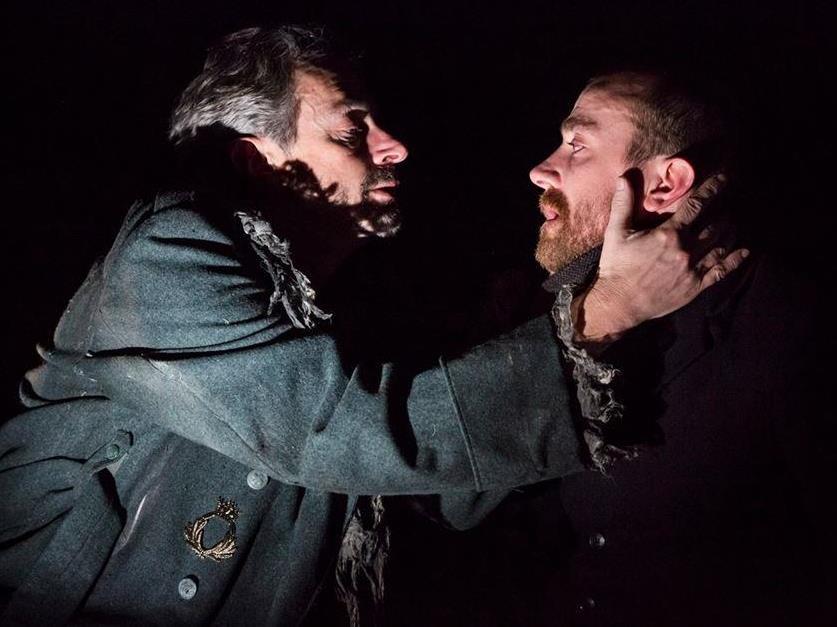Photo by Daniel Boud
Bell Shakespeare’s latest production Hamlet, directed by Damien Ryan, successfully marries the tale of court intrigue in the late Middle Ages with Cold War politics. It is an interesting take on the classic play, one that places emphasis on the subplot of Norway’s potential invasion by young Fortinbras through the more familiar circumstances of contemporary military policy. Fortunately, this does not overshadow our tragic hero’s struggle with the revenge mission he has been tasked with. Instead it complements and adds depth to the circumstances in which ‘Denmark is a prison’.
The skilled cast were all excellent in their portrayals of each character and with a deft hand delighted the audience with their timing and interpretation of the Shakespearean verse and prose. The meeting between Laertes (Michael Wahr) and Ophelia (Matilda Ridgway) before he leaves for France deserves special mention, as this amusing exchange between siblings aptly showed genuine mutual affection and unresolved conflict. Philip Dodd’s performance as Polonius and the Gravedigger demonstrated his extensive experience as, with expert delivery, he often teased the audience into laughter.
But, as you would expect, Josh McConville’s performance as Hamlet excelled. His portrayal of grief over his father’s death broke hearts and his take on the Prince of Denmark’s descent into madness raised the question of depression in a different interpretation of the play that has customarily masked Hamlet’s actions within the subject of insanity, feigned or real.
The subject of gender was also raised, almost imperceptible yet evident in the gender-bending roles of Julia Ohannessian and Catherine Terracini as the players. Terracini enters as Player One, wearing a beard that hides her face, which Hamlet pulls down to reveal her features – it is not a moment that we read Terracini as playing a male role, but resettles this assumption as a female role. To draw attention to this, a banner is drawn across the stage renaming the troupe ‘Yorick’s Daughters.’ A clever casting selection as they take on roles traditionally played by men, reminding us that in Elizabethan times women were not allowed on stage – a fact that many renditions of Hamlet have continued in their portrayal of cross-dressing male performers as the Player Queen. Similarly, Young Fortinbras (Terracini) adds another female role to the play.
The interpretation of Gertrude (Doris Younane) and Ophelia (Matilda Ridgway) also draws from recent feminist engagements with the play. Gertrude is not a victim of circumstances but attempts to intervene; a concerned mother dealing with her perception of madness in her ‘too much changed son’. Younane brings humanity to this maternal character who has been previously maligned. Ophelia is likewise conveyed and her mistreatment by the powerful men in her life and her descent into insanity is given its own independent resonance for the audience.
Costume and set design were both successful, the set dividing upstage and downstage with a useful row of glass doors that help to distinguish between the public and private scenes in the play. It also added another element to the setting of court intrigue, with its overheard secrets and rats always hiding nearby. Costume design successfully supports the company’s reinterpreted setting of contemporary politics and helps settle the audience comfortably within this new temporality through contemporary dress. The only major fault of the play is the sound design during the sword fight between Laertes and Hamlet, which distracts while it attempts to build suspense.
This production creates new resonances for the classic play without neglecting the important characterisation of Hamlet that fans expect. Bell Shakespeare believes that classic texts are key to exploring our present and Hamlet successfully builds on this belief. It is a compelling fusion between the contemporary and the past, as a play set in a changing political system, traditionally the collapse of the feudal system in the late Middle Ages, resonates with modern-day politics.
Rating: 4.5 out of 5 stars
Hamlet
By William Shakespeare
Director: Damien Ryan
Designer: Alicia Clements
Lighting Designer: Matt Cox
Composer & Sound Designer: Steve Francis
Fight Director: Nigel Poulton
Cast: Philip Dodd, Ivan Donato, Robin Goldsworthy, Josh McConville, Julia Ohannessian, Sean O’Shea, Matilda Ridgway, Catherine Terracini, Michael Wahr, Doris Younane
Bell Shakespeare
Melbourne: 14 July – 25 July
Canberra: 13 October – 24 October
Sydney: 27 October – 6 December
See bellshakespeare.com.au for additional dates





